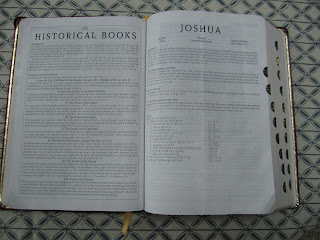Posted by Lisa Laree to Beer Lahai Roi
The tail end of Joshua 8 is a break in the narrative and we have to go back to Deuteronomy 27 to see what was going on...the instructions that Moses gave the folks.
When you have crossed the Jordan into the land the LORD your God is giving you, set up some large stones and coat them with plaster. Write on them all the words of this law when you have crossed over to enter the land...and when you have crossed the Jordan, set up thes stones on Mount Ebal, as I command you today, and coat them with plaster. Build there an altar to the LORD your God, an altar of stones. Do not use any iron tool upon them. Build the altar of the LORD your God with fieldstones and offer burnt offerings on it to the LORD your God....and you shall write very clearly all the words of this law on these stones you have set up." (Deut. 27:2-8, all scripture today from the NIV 84).
So...after defeating Jericho and Ai, before they do anything else, there is a worship service.
Then Joshua built an altar on Mount Ebal, an altar to the LORD, the God of Israel, as Moses the servant of the LORD had commanded the Israelites. He built it according to what is written in the Book of the Law of Moses -- an altar of uncut stones, on which no iron tool had been used. On it they offered to the LORD burnt offerings and sacrificed fellowship offerings. There, in the presence of the Israelites, Joshua copied on stones the law of Moses; which he had written. (Josh. 8:30-32).
So, the stones were found and the altar assembled, the Law recorded and the offerings made. But there was more...a declaration to be made by the Levites and all the people.
When you have crossed the Jordan, these tribes shall stand on Mount Gerizim to bless the people: Simeon, Levi, Judah, Issachar, Joseph and Benjamin. And these tribes shall stand on Mount Ebal to pronounce curses: Reuben, Gad, Asher, Zebulun, Dan and Naphtali. (Deut 27:12-13)
Interestingly, Deuteronomy goes on to list a script for the curses...and just the curses. We don't have a script for the blessings; no similar detailed version of the declarations and responses that were to be made with the folks standing on the mountain. Maybe it was more important to record what behaviors would be unacceptable? There are lists of blessings and curses in Deuteronomy 28; presumably the declaration of blessing was taken from that list.
However they worded those blessings, we do know that they stood on the mountains and made the proclamations:
All Israel, aliens and citizens alike, with their elders, officials and judges, were standing on both sides of the ark of the covenant of the LORD, facing those who carried it -- the priests, who were Levites. Half of the people stood in front of Mount Gerizim and half of them in front of Mount Ebal, as Moses the servant of the LORD had formerly commanded when he gave instructions to bless the people of Israel. (Josh. 8:33)
In all honesty, I'm not sure they DID do a proclamation/response when they were all arranged on the mountains. Verse 34 reports
Afterward, Joshua read all the words of the law -- the blessings and the curses--just as it is written in the Book of the Law.
So...did they do an interactive bit, and then Joshua read over the blessings and curses in Deut. 28? Or were they positioned to hear the declaration from Joshua, and Joshua read it over them? From Deuteronomy, it appears the people themselves were to pronounce the blessings and the curses. I kinda think they did both, because
There was not a word of all that Moses commanded that Joshua did not read to the whole assembly of Israel, including the women and children, and the aliens who lived among them. (Josh. 8:35).
But, however they did it, they made a deliberate stop in their campaign to worship and rehearse the promises and warnings.
I think there's a pretty key principle there...even in the midst of a busy season, of pushing and advancing, it's essential to take time to worship and review God's promises...and His warnings. Of course, reciting the blessings and curses is not the same as living in mindfulness of them, but, still, it's a good start.
Do I get so head-down-push-to-finish that I forget to stop and spend time in worship, listening to what God is telling me?

No comments:
Post a Comment